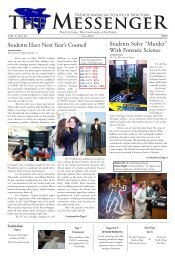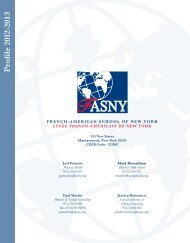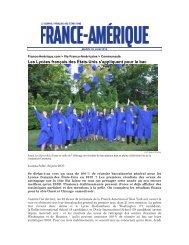FASNY Headmaster Retires - Franco-American School of New York
FASNY Headmaster Retires - Franco-American School of New York
FASNY Headmaster Retires - Franco-American School of New York
- No tags were found...
You also want an ePaper? Increase the reach of your titles
YUMPU automatically turns print PDFs into web optimized ePapers that Google loves.
Opinion 5Ju n e 2012IntercoursA Column That Strives Not ToInclude Mature SubjectsThe Goodand the BadBy Michael Anderson andArmand LatreilleIntercours is back froma one-issue hiatus! If you hadn’tnoticed that gaping awkwardhole in the last Messenger issue,it’s because our last columnwas deemed a little too controversialby higher powers. Asa result, we’ve come up withsomething not controversial atall: our unbiased opinions onrandom things! Actually, we’veworked hard on this installment,to make up for the lastone. We took some precioustime away from Bac revisionsand finals studying to collectour thoughts for a moment,and reflect on the year thatwas. Without further ado, thisis Intercours’s season finale.LinsanityES WorkloadGiants Super BowlJiminy PeakEnd <strong>of</strong> tyrant regimesJustice @ terminal 5The rentrée that wasn’t (flood)End <strong>of</strong> the world in 7000 yearsKONY 2012 YEAAAAH(just kidding, why is nobodypaying attention to Syria?)NBA on ChristmasSenior PrankEnd <strong>of</strong> the war in Iraq7th Billion baby bornSpirit Week SpiritHalloween ParadeRugby InjuriesShark MascotSpace Shuttles retiredDie down <strong>of</strong> Occupy movementsDeath <strong>of</strong> Steve JobsS WorkloadPakistan FloodingKnicks First Round ExitGreek CrisisThe Entire Month <strong>of</strong> February:SAT, TPE, and Bac Blanc<strong>School</strong> on SaturdayRock Bottom Meh AwesomeBy Armand LatreilleExactly a year ago, thisnewspaper published anarticle explaining why NicolasSarkozy would liveto serve another term asthe President <strong>of</strong> France.I thought it was a brilliantarticle that perfectlyIllustration by Louis Le Jamteloutlined Sarkozy’s assetsin contrasts to <strong>Franco</strong>isHollande’s weaknesses. Needless to say, my predictionturned out wrong, and Hollande replaced Sarkozy as theincumbent <strong>of</strong> the Elysee Palace a month ago. Why did itcome to this?Sarkozy’s presidency started with a misstep thatwould symbolize his governing style: instead <strong>of</strong> celebratinghis victory with the thousands that were waitingin la Place de la Concorde, him and 60 select few barricadedthemselves at Fouquet’s, one <strong>of</strong> the more “upscale”restaurants in Paris. Attendees included Frenchbillionaires, finance moguls, CEOs <strong>of</strong> important Frenchcorporations, and Johnny Hallyday. In other words, theentire who’s who <strong>of</strong> powerful French personalities waspresent. Needless to say, nobody in France except the 60people invited thought this was the best way to start <strong>of</strong>fa presidency. Imagine if Obama had suddenly decidedto ditch his election party at Grant Park and insteadhead to a posh <strong>New</strong> <strong>York</strong> City restaurant to eat lobsterwith Trump, CEOs <strong>of</strong> Goldman Sachs and JP Morgan,Rupert Murdoch, and Bruce Springteen.During his campaign, Mr Hollande frequentlytalked about the dignity <strong>of</strong> the French presidency, radicallymore so than in previous campaigns. Indeed, hesaw the important hatred; disgust, and distrust Franceas a whole felt for Sarkozy, and wisely ran a campaignwhose semi-<strong>of</strong>ficial main slogan was “5 years <strong>of</strong> Sarkozyis enough”. Mr Sarkozy was never a president <strong>of</strong> thepeople, rather, he was viewed as a “bling, bling” personality,meaning attracted to all that shines and makesnoises. It was easy to point out his dérapages, becausethey were frequent and gave fodder to tabloids. Sarkozywasn’t educated through the traditional grandes écoles,the very prestigious and elitist French universities, unlike<strong>Franco</strong>is Hollande. He liked to say what was onhis mind, and he was anything but s<strong>of</strong>t-spoken. Furthermore,he championed wildly unpopular austerityreforms that gave the impression he was disconnectedfrom the hardships <strong>of</strong> the French. That, and his verypublicized and self-proclaimed 140% pay raise didn’thelp. Despite being a powerful speaker, his public behaviorwas detestable to many voters, whom saw in hima mean, arrogant, and incapable little man. Simply put,he was an anthipathetic president.French voters historically favor “close to thepeople” presidents. They need a president that they canrelate to, and in many elections, the electorate favoredthe president whom they could picture themselves sitdown and have a beer with. Sarkozy was literally the antithesis<strong>of</strong> the model president. Never in five years didFrance feel represented in him, and he never really actedto change that. He was vulgar and his early mistakes (likethe Fouquet’s dinner) had a lasting impression. What’smore, voters recognized his efforts towards fixing theeconomy, and other overall policies: polls suggest thatSarkozy has a better record (against Hollande) in having“the authority <strong>of</strong> a head <strong>of</strong> state” and for being “capable<strong>of</strong> taking the right decisions faced with the current economicand financial crisis.”France’s Changing Political SceneHollande entered the presidential race as a pr<strong>of</strong>oundoutsider. Indeed, many speculate that, had DominiqueStrauss-Kahn not been implicated in the murkyrape scandal in <strong>New</strong> <strong>York</strong> last summer, he would havenever secured the nomination. Hollande was rocked byultra-left challenger Mélanchon, and was an easy targetfor criticism: he had, after all, never held an importantgovernment position; and his policies in home departmentCorreze left the budget riddled with debts. However,he was s<strong>of</strong>t-spoken, humble, calm, and appealingto voters who simply wanted to get rid <strong>of</strong> Sarkozy.In trying times, the French needed to be re-assured,and Mr. Hollande did just that. While recognizingthe width <strong>of</strong> the financial crisis, Hollande made achoice in opting to criticize the difficult steps Sarkozyhad taken to end the crisis (pension age at 60, diminishing<strong>of</strong> public sector employees); and comfort the electoratewith popular policies (attack on the richest, augmentation<strong>of</strong> teachers by 60, 000 posts). His proposal <strong>of</strong>a 75% tax on millionaires is an example <strong>of</strong> a gratuitouspromise, aimed at striking voter’s heart- not their brains.It’s easy to blame the banks, the rich, and the marketsfor the financial hardships France has to face. It’s harderto advocate unpopular reforms (read: austerity) neededto steer clear <strong>of</strong> trouble.Instead <strong>of</strong> pushing for a balanced budget, ora roll-back <strong>of</strong> state spending, both Sarkozy and Hollandestuck to calmer seas; promised to expand the role<strong>of</strong> the state and supervision <strong>of</strong> markets. Now, both <strong>of</strong>them are smart men, which have many other intelligentaides. They know that this is not the recipe forbetter economic times.However, it seemed like any method was acceptablefor gaining voters. Sarkozy, for example, toughenedup his stance and advocated a borderline xenophobicagenda concerning immigration to woo extreme-rightvotes. As a result, no one was quite sure what wouldeach candidate do once in <strong>of</strong>fice. For example, not manyvoters actually thought that Hollande’s tax proposal wascredible. Many critics, however, observed that Sarkozyhad the personality and potential to pass the hard reforms;while Hollande would likely be more influencedby the electorate. And, the vote reflected that belief.France was scared <strong>of</strong> Sarkozy, and it became Hollande’selection to loose. After Sarkozy failed to muster his eloquenceduring the single debate, it was clear that he hadlost the vote.Was the election a total rebuttal <strong>of</strong> Sarkozy’spolicies? Not really.While some <strong>of</strong> his reforms were unpopular,many saw the good in them. Furthermore, he wasn’t asradical as some people had hoped he would be, but thetendency showed promise. He fostered an important relationshipwith foreign leaders, particularly Germany’sAngela Merkel and USA’s Barack Obama. He did putFrance back on the map, and strengthened its relationshipwith its allies. On the home front, he wasn’t afraidto advocate a tough—but somewhat popular—stanceon immigration and racial problems (see the ban onveils), and he set the country on the right path towardseconomic recovery.If anything, this election is the pro<strong>of</strong> that personalitydoes have an impact on the voters. France showedup en masse against Sarkozy the man, not the president.And, as I re-read last year’s article, I realize that I, too,vouched for Sarkozy- the president, not the man. I waswrong.
















